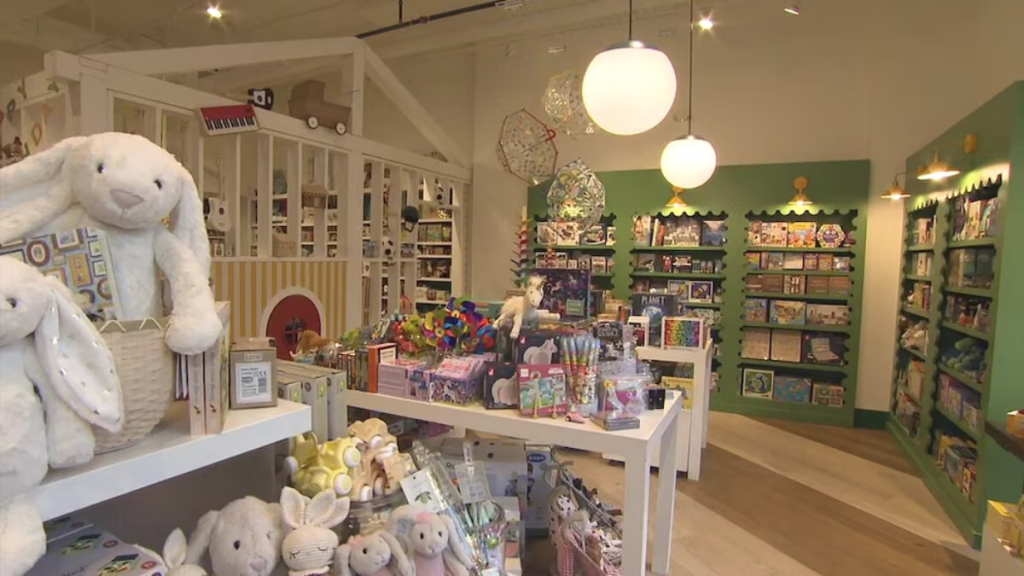As the U.S. escalates its trade confrontation with China, small business owners across the country are feeling the pressure—none more so than toy store operators. With a new wave of tariffs targeting Chinese imports, American retailers warn that the price of toys could skyrocket in the coming months, just ahead of the holiday shopping season.
For toy shop owners, the stakes are high. Nearly 80% of all toys sold in the United States are manufactured in China. With new tariffs proposed by the Biden administration, many of those toys could soon carry a much higher price tag, forcing retailers to either absorb the added costs or pass them on to already budget-conscious customers.
A Personal Blow for Independent Retailers
Jennifer Bergman, who has operated West Side Kids in New York City for more than three decades, says the new tariffs could be a fatal blow for many independent toy stores. “Roughly 90% of the toys we carry are made in China,” Bergman said. “There’s simply no escaping it. If the tariffs go into effect, the prices will increase dramatically—and I don’t know how families will afford it.”
According to The Toy Association, an industry group representing manufacturers and retailers, tariffs could raise consumer prices on dolls, puzzles, games, and plush toys by 15% to 20%. These hikes would likely hit right as families begin shopping for birthdays and the winter holidays.
The administration’s justification for the new tariffs centers on protecting U.S. intellectual property and leveling the playing field in global trade. According to the Office of the United States Trade Representative, the move is part of a broader plan to combat “unfair Chinese practices” related to technology transfer and industrial subsidies. But retailers say they’re the ones paying the price—literally.
Few Alternatives to Chinese Manufacturing
Despite years of talk about diversifying the supply chain, China remains dominant in the toy manufacturing sector. The country has spent decades developing efficient factories, experienced labor, and an ecosystem of suppliers that’s nearly impossible to replicate elsewhere.
Steve Rad, CEO of Abacus Brands, a maker of STEM-focused toys, explored moving production to Southeast Asia to avoid tariffs but ran into significant roadblocks. “Vietnam, Cambodia—those countries just don’t have the scale or infrastructure to support our needs,” Rad said. “The know-how that China offers can’t be found anywhere else.”
Greg Ahearn, president of The Toy Association, echoed that sentiment. “Toy manufacturing is incredibly specialized. The molds, the testing requirements, the safety standards—China has built that up over decades. Shifting production isn’t as simple as moving factories; it would take years, maybe decades.”

Sticker Shock for Parents and Families
Retailers aren’t the only ones bracing for impact. Analysts estimate that the average American family could see as much as $4,700 in additional annual costs if tariffs continue to escalate. These expenses are expected to hit hardest during key gift-buying seasons, such as Christmas.
For parents, this could mean choosing between fewer gifts or higher credit card bills. “We’re already dealing with inflation in groceries and rent,” said Alexis Murphy, a mother of three in Chicago. “Now toys too? It’s going to be a rough year for families trying to make ends meet.”
Economists warn that these increased costs could have a ripple effect on the broader economy. Slower consumer spending—especially in retail—can lead to reduced inventory orders, staff reductions, and even store closures. According to financial institutions like JPMorgan Chase, if tariffs continue unchecked, they could contribute to a slowdown in national GDP growth.
Retailers Look for Temporary Fixes
Some toy stores are getting creative to minimize losses. Owners are renegotiating contracts with suppliers, changing packaging to cut shipping costs, or buying inventory in bulk before tariffs are implemented. Still, these are temporary solutions.
Richard Derr, who runs a Learning Express franchise in Illinois, said some suppliers have already raised prices in anticipation. “A few are trying to squeeze in shipments before the tariffs take hold, but it’s a gamble,” he explained. “We may be forced to stop carrying some products entirely if they become too expensive.”
Other retailers are considering stocking more American-made or European-made toys, though those often come with their own high costs or limited availability. “Made in USA sounds great, but there’s just not enough domestic production to meet demand,” Derr added.
The Bigger Picture: Trade, Politics, and Uncertainty
Trade tensions between the U.S. and China have persisted for years, but many business owners hoped for stability after the disruptions of the COVID-19 pandemic. Instead, they’re now facing a new round of uncertainty that may stretch into the 2026 election season.
Some experts argue that tariffs are an ineffective long-term strategy and instead call for direct negotiations or alternative incentives to boost domestic manufacturing. Meanwhile, small business owners feel caught in the middle of a geopolitical tug-of-war.
“We’re trying to run businesses and serve our communities,” Bergman said. “But we can’t do that when policy decisions are made without considering the real-world consequences.”
Conclusion: The Clock Is Ticking
As the tariff rollout nears, time is running out for toy retailers to prepare. Many fear they will be forced to raise prices, reduce their product offerings, or shut their doors altogether.
For families, the added costs could strain holiday budgets and reduce access to educational and imaginative toys for children. For store owners like Bergman and Derr, the challenge lies in navigating a global trade war with limited options.
Until a resolution is found, the nation’s toy industry finds itself caught in a precarious game—one where no one truly wins.
Disclaimer – Our team has carefully fact-checked this article to make sure it’s accurate and free from any misinformation. We’re dedicated to keeping our content honest and reliable for our readers.
